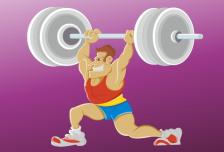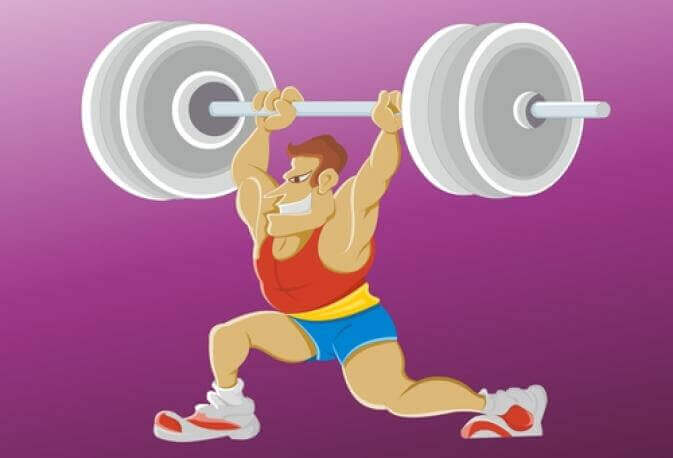Hormonal Imbalances and Weight Gain, Part 2
You exercise, watch your diet, and still the pounds won’t come off (or worse, you gain weight!) Can hormones be to blame? Get-Fit Guy explains the connection between exercise, weight, and your hormones in Part 2 of this series.
Ben Greenfield
Listen
Hormonal Imbalances and Weight Gain, Part 2

In last week’s episode, Hormonal Imbalances and Weight Gain, Part 1, we learned how hormonal imbalances, and specifically estrogen dominance in women, may make it impossible to lose weight, no matter how much you exercise.
In that episode, I mentioned that I often notice a different reason for resistance to weight gain (or a propensity to gain weight!) in men. So today, you’ll learn about a common hormonal deficit called andropause that may hold you back from being able to achieve your ideal body.
.
Want to get in the best shape of your life – fast? Check out Get-Fit Guy’s Guide to Achieving Your Ideal Body today!
What is Andropause?
From about age 30 on, men’s testosterone levels naturally decline, while the hormone that can bind testosterone in the blood stream (called sex hormone binding globulin) tends to increase. This one-two whammy can become even more pronounced when combined with exposure to environmental estrogens, which you learned about in the previous episode Hormonal Imbalances and Weight Gain, Part 1, and which I also discussed in the episode How to Get Rid of Man Boobs.
When testosterone levels drop below what would be considered normal laboratory values, the medical term “hypogonadism” is used to describe the condition. However, andropause (or occasionally “manopause”) is a more popular term for the menopause-like experience in men. Unlike women, we don’t actually experience a complete shutdown of our reproductive system, but when our testosterone levels fall, we can experience, among other unpleasant symptoms, a loss of lean muscle mass, a decreased metabolism, and a lower ability to push during a workout – all of which can decrease the ability to lose weight no matter how much exercise we do. The accompanying loss of libido can also affect our actual motivation to exercise, since many men will admit that one major reason for working out is to look their most attractive!
Ultimately, if you’re over age 30, and you’re experiencing a drop in energy and libido, as well as a creeping layer of fat on your waistline, andropause may certainly be a big contributor.
How to Test Testosterone Levels
If you’re curious to actually quantify whether or not your testosterone levels are sufficient, there are a several options. In most cases, it’s best to get a measurement of your “free” testosterone, which can be done via a saliva test or a blood test. No matter what test method is used to determine your free testosterone, you probably don’t have any issues if your level is in the upper one-third of normal for a 20-29-year-old male. This is typically around in the range of 42-145 pg/ml for a salivary free testosterone result, and 500-827 nanograms/dL for a total testosterone result.
Most men don’t realize that you can easily get tested at home by using home testosterone test kits from sources such as DirectLabs.com, Bioletics.com, or WellnessFX.com. I personally test my levels about once every 6 months.
How to Raise Testosterone Levels
So what can you do about if you find out or suspect that you have low testosterone levels?

Before discussing how to raise testosterone levels, I need to mention that I certainly realize this is a multi-million dollar industry which contains many different medical opinions, patches, injections, prescription drugs, herbal remedies, and literally hundreds of different testosterone-enhancing formulas and cocktails.
In other words, this topic is a can of worms! So rather than addressing every testosterone boosting supplement and natural remedy that exists, I’m primarily going to focus on why testosterone might be low in the first place, and on important lifestyle choices to naturally boost testosterone levels and help with andropause. And as you learned in the episode Do Weight Loss Supplements Really Work?, it’s the lifestyle changes that tend to make a much bigger difference than simply popping pills.
-
Testosterone Tip #1: The first reason that you may have a testosterone deficiency is because too much of your testosterone is getting converted into estrogens. The enzyme that is responsible for this conversion is called “aromatase,” and interestingly, it rises when you have constantly high insulin levels. What spikes insulin levels? Constant snacking, very large meals, and high consumption of carbohydrates and sugar. So try to limit snacking, eat foods higher in healthy fats and proteins.
-
Testosterone Tip #2: The second reason you may have a testosterone deficiency is because you have too much sex hormone binding globulin binding up testosterone and keeping it from being active. One of the primary ways that this happens is via a high level of inflammation. My fellow Quick and Dirty Tips expert Nutrition Diva has a great episode on foods that fight inflammation. In addition to her tips, you shold focus on not exercising too hard for too long and giving yourself rest and recovery days if you’re working out frequently.
-
Testosterone Tip #3: Chronic stress, low sleep, excessive exercise can decrease testosterone, primarily by elevating your “fight and flight” cortisol hormone, which causes you to mobilize lots of sugar for you to run from a lion, or get to work faster, which results in a spike in insulin. In addition, your body must use a hormonal building block called “pregnenolone” to make cortisol. So as your cortisol rises, there’s that much less pregnenolone available to make testosterone!
In summary, lifestyle choices that you can make to avoid a testosterone deficiency include avoiding excess calorie consumption, limiting sweet carbohydrates, eating more appetite satiating fats and proteins, avoiding excessive exercise, sleeping more, and stressing less!
What About Natural Hormone Replacement Therapy?
Many physicians who find you to have low testosterone may prescribe testosterone creams and injections, which enter your body in a free and “unbound” form. You’ll immediately notice positive changes, but your body will sense this higher testosterone and eventually shut down production of important natural testosterone elevators, specifically hormones called luteinizing hormone (LH) and follicle stimulating hormone (FSH). As more and more free testosterone gets introduced via creams and injections, your cell’s receptor sites for testosterone can lose sensitivity, and the body will need more and more of the natural hormone replacement therapy to keep getting good effects.
So while natural hormones can certainly help raise testosterone, you’ll need to take more and more over time—and you’ll feel pretty awful if you ever stop! So be sure to have a frank discussion with your physician or medical advisor before heading down this road.
I realize that in the past two episodes, we’ve only just scratched the surface on how hormones can affect weight gain and weight loss, so if you have more questions, email me at getfitguy@quickanddirtytips.comcreate new email or visit Facebook.com/GetFitGuy!
Betterment LLC is an SEC Registered Investment Advisor. Brokerage services are offered by Betterment Securities, an SEC registered broker-dealer and member FINRA/SIPC.
Investments are not FDIC Insured. No Bank Guarantee. May Lose Value.
Investing in securities involves risks, and there is always the potential of losing money when you invest in securities.
Before investing, consider your investment objectives and Betterment’s charges and expenses.
Not an offer, solicitation of an offer, or advice to buy or sell securities in jurisdictions where Betterment and Betterment Securities are not registered.

